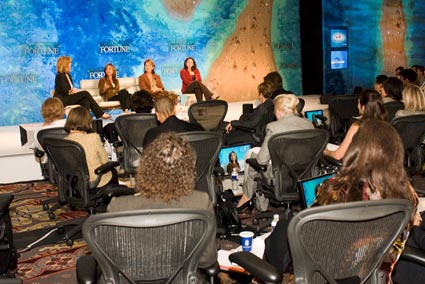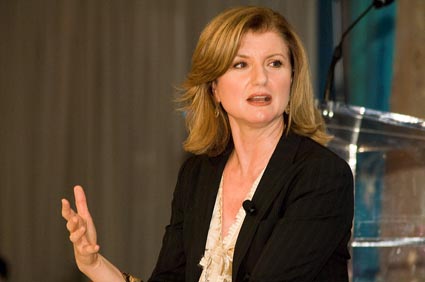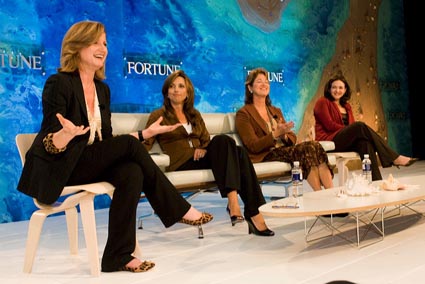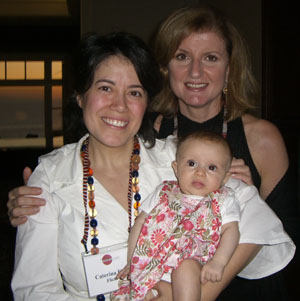I've spent the early part of this week attending a pair of terrific conferences in Laguna Niguel, California: the Most Powerful Women Summit sponsored by Fortune and the first ever WebbyConnect conference put together by the people who brought us the Webby Awards.
I had two big conference takeaways -- one covered matters of spirit, the other matters of commerce.
Let's start with the spirit, and the Fortune conference, attended by hundreds of highly accomplished women. I was moderating a panel with Beth Comstock of NBC, Sheryl Sandberg of Google, and Jane Thompson of Wal-Mart Financial Services on "Mavericks: Leaders Who Shake up Businesses and Industries," but the discussion ended up focusing on whether you can be an over-achieving maverick and still have balance in your life.

Arianna moderating the panel with Beth Comstock, Jane Thompson and Sheryl Sandberg.
Over the course of the conversation, in the Q & A period that followed, and throughout the conference when we were approached by other women sharing their juggling acts with us, it became clear to me that we are entering an era of growing questioning of the quality of our always connected lives.
Jibing with the themes we are exploring on our newly revamped Living Now page was my realization that the next big thing on the Internet will be a paradox: connecting in order to learn how to better disconnect from our always connected lives and reconnect with ourselves -- which is, after all, the ultimate connection.
And it wasn't just the older ones among us who felt this urge. Caterina Fake, co-founder of Flickr, holding her 4-month old baby in her arms, told me that she's been thinking about these issues and about what she wanted to teach her baby about life, ever since she became pregnant.
I, of course, asked her to blog about it.
For me, it was reconfirmation of my own rude awakening earlier this year when I was pushing myself too hard and ended up passing out and breaking my cheekbone! The path to rebalancing my life began with cutting back from having three BlackBerrys with me at all times to only having two. But, as I told the conference, disconnecting/reconnecting is all about the process.
Over at WebbyConnect, the talk was about a trend that is already happening: the realization by a growing number of major media companies that the best way to succeed -- and make money -- in the Brave New Media World is to give away your content. Forward thinking companies are now adopting long-term growth strategies, and moving away from short-term profit-seeking.
"Make as much as you can, any way you can" was the approach many big companies had taken to monetizing the web. The New York Times stuck some of its most popular content behind a pay wall, and Microsoft stuck 30-second pre-roll ads on its MSN Video videos.
Neither of these strategies paid off: online readership of the Times' columnists dropped, and users at MSN complained of a negative user experience.
So now TimesSelect is dead. MSN is cutting way back on pre-roll ads. And, elsewhere, CBS has made a major u-turn away from the notion of hording its content on its own site, instead letting its material be available all over the web. Quincy Smith, the new president of CBS Interactive put it this way: "CBS is all about open, nonexclusive, multiple partnerships."
The conclusion is inescapable: online, promiscuity can be profitable. And not just when it comes to porn!
To its credit, CBS and other major players are finally realizing that the key to online success is community, community, community.
And you can't build community without showing your users that you are in the relationship for the long-haul, and not just a quick buck -- the online equivalent of a one-night stand.
Our 2024 Coverage Needs You
It's Another Trump-Biden Showdown — And We Need Your Help
The Future Of Democracy Is At Stake
Our 2024 Coverage Needs You
Your Loyalty Means The World To Us
As Americans head to the polls in 2024, the very future of our country is at stake. At HuffPost, we believe that a free press is critical to creating well-informed voters. That's why our journalism is free for everyone, even though other newsrooms retreat behind expensive paywalls.
Our journalists will continue to cover the twists and turns during this historic presidential election. With your help, we'll bring you hard-hitting investigations, well-researched analysis and timely takes you can't find elsewhere. Reporting in this current political climate is a responsibility we do not take lightly, and we thank you for your support.
Contribute as little as $2 to keep our news free for all.
Can't afford to donate? Support HuffPost by creating a free account and log in while you read.
The 2024 election is heating up, and women's rights, health care, voting rights, and the very future of democracy are all at stake. Donald Trump will face Joe Biden in the most consequential vote of our time. And HuffPost will be there, covering every twist and turn. America's future hangs in the balance. Would you consider contributing to support our journalism and keep it free for all during this critical season?
HuffPost believes news should be accessible to everyone, regardless of their ability to pay for it. We rely on readers like you to help fund our work. Any contribution you can make — even as little as $2 — goes directly toward supporting the impactful journalism that we will continue to produce this year. Thank you for being part of our story.
Can't afford to donate? Support HuffPost by creating a free account and log in while you read.
It's official: Donald Trump will face Joe Biden this fall in the presidential election. As we face the most consequential presidential election of our time, HuffPost is committed to bringing you up-to-date, accurate news about the 2024 race. While other outlets have retreated behind paywalls, you can trust our news will stay free.
But we can't do it without your help. Reader funding is one of the key ways we support our newsroom. Would you consider making a donation to help fund our news during this critical time? Your contributions are vital to supporting a free press.
Contribute as little as $2 to keep our journalism free and accessible to all.
Can't afford to donate? Support HuffPost by creating a free account and log in while you read.
As Americans head to the polls in 2024, the very future of our country is at stake. At HuffPost, we believe that a free press is critical to creating well-informed voters. That's why our journalism is free for everyone, even though other newsrooms retreat behind expensive paywalls.
Our journalists will continue to cover the twists and turns during this historic presidential election. With your help, we'll bring you hard-hitting investigations, well-researched analysis and timely takes you can't find elsewhere. Reporting in this current political climate is a responsibility we do not take lightly, and we thank you for your support.
Contribute as little as $2 to keep our news free for all.
Can't afford to donate? Support HuffPost by creating a free account and log in while you read.
Dear HuffPost Reader
Thank you for your past contribution to HuffPost. We are sincerely grateful for readers like you who help us ensure that we can keep our journalism free for everyone.
The stakes are high this year, and our 2024 coverage could use continued support. Would you consider becoming a regular HuffPost contributor?
Dear HuffPost Reader
Thank you for your past contribution to HuffPost. We are sincerely grateful for readers like you who help us ensure that we can keep our journalism free for everyone.
The stakes are high this year, and our 2024 coverage could use continued support. If circumstances have changed since you last contributed, we hope you'll consider contributing to HuffPost once more.
Already contributed? Log in to hide these messages.



